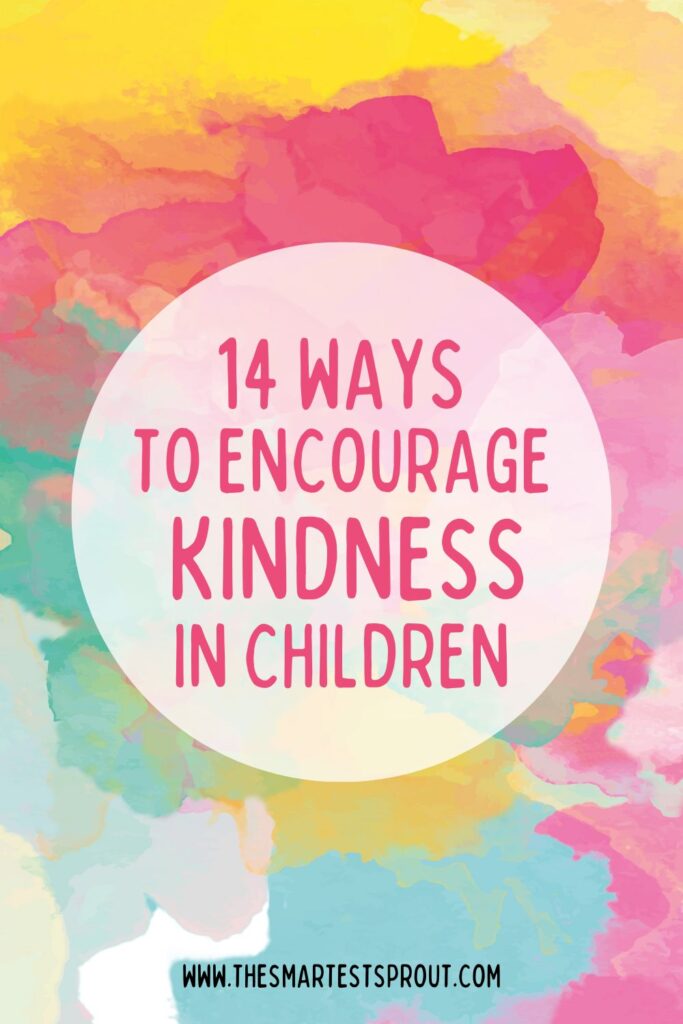14 Simple Ways to Encourage Kindness in Children

This post contains affiliate links. Read our affiliate disclosure here.
As a parent, one of your most important jobs is to encourage kindess in your children. Learning this important life skill will set your child up for a lifetime of positivity and generosity. Below, we reveal several simple ways you can increase kindness in your little ones.
Why is it Important to Encourage Kindness in Children?
Being kind helps children to develop empathy, compassion, and positive relationships with others. It also contributes to creating a more harmonious and cooperative community. Kindness can also improve a child’s own self-esteem and mental well-being. Furthermore, learning to be kind at a young age can set a strong foundation for a lifetime of positive and respectful interactions with others.
The Repercussions of Not Teaching Kindness
If a child does not learn how to be kind to others, they may have difficulties in forming and maintaining positive relationships with peers and adults, both in personal and professional settings. This could lead to social isolation, difficulties in communication and collaboration, and potentially lower self-esteem and confidence. Additionally, unkind behavior can have negative consequences for others, potentially causing harm and damaging relationships. It is important for parents and caregivers to provide guidance and modeling of positive social behavior to help children develop strong social and emotional skills.

Simple Ways to Encourage Kindness in Children
1. Lead by example: Children learn best by watching their parents and other adults. Model kindness in your own behavior and talk about why it’s important.
2. Praise kind acts: When you see your child being kind, make sure to acknowledge and praise their behavior.
3. Teach empathy: Help your child understand what others might be feeling. This will encourage them to think about others when making decisions and acting.
4. Encourage acts of kindness: Encourage your child to perform small acts of kindness, like helping a friend or offering to share their toys.
5. Teach coping skills: When children are upset, they may not be able to act with kindness. Teach your child coping skills, like deep breathing and counting to ten, to help them regulate their emotions.
6. Read books and watch shows that promote kindness: Find books and media that feature characters who are kind and compassionate. Discuss these characters and the positive impact of their actions.
7. Volunteer together: Engage in community service together, as a family. This can help children see the positive impact they can have on others and reinforce the importance of kindness.
8. Encourage kindness through play: Play games that promote cooperation, sharing and helping others, such as board games or team sports.
9. Teach conflict resolution: Teach your child how to resolve conflicts peacefully and kindly, and model this behavior yourself.
10. Talk about emotions: Discuss with your child how different emotions can drive behavior and encourage them to understand why it’s important to be kind, even when others are not.
11. Encourage gratitude: Teach your child to be thankful for what they have and to express gratitude towards others.
12. Support community service: Encourage your child to participate in volunteer activities, such as donating toys to a children’s hospital or helping to clean up a local park.
13. Highlight the positive: Point out positive behavior in others and emphasize how it makes them and those around them feel.
14. Create a kindness jar: Encourage your child to perform acts of kindness and write them down on pieces of paper. Place the notes in a jar as a way to track their progress and recognize their efforts.
Final Thoughts
Remember, the most important thing is to consistently model kindness in your own behavior and to make sure your child understands why it’s important to be kind to others. It may be hard at times, but think about the impact you’re having on your child who is observing you and it will start to come naturally before you know it.
Other Articles You May Enjoy:
Share This Page on Social Media:
Let’s Be Friends!
Follow The Smartest Sprout on Facebook and Instagram! Discover the latest parenting tips, activity ideas, and more! Plus, get deal alerts on our favorite educational toys and healthy family essentials!



